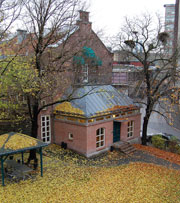Internationalism and the Nordic countries
The internationalism of the Nordic countries is characterised by a general commitment to international institutions and law, agenda-setting and bridge-building between North and South, East and West alike. The Nordic countries traditionally provide high levels of development aid. These and other characteristics have elicited diverse responses, including the accusation that the Nordic countries behave like ’moral superpowers’ and that they engage in certain international issues so they are more easily able to bow out of others.

What has influenced the Nordic region’s specific brand of internationalism
The Nordic governments’ involvement and behaviour in international affairs have been shaped by being moderately populated and highly dependent on economic and cultural exchange with the outside world. This is so despite their geographical location on the European periphery. It has also been influenced by the individual identities and histories of each of the countries, such as whether they are former regional powers or dependent areas, as well as pride over their successful domestic development in modern times. A common trait of the Nordic countries’ political culture of the twentieth century was the desire to assume a constructive, but distant role in international relations. They have also cultivated and taken advantage of the label ‘Scandinavian’ or ‘Nordic’ as a brand or model for a sober and rational approach to international relations in agreement with the common global interest.
Are the Nordic countries resistant to supranational projects like the EU?
Nordic internationalism is firmly grounded in the concept of the co-operation of (enlightened) nation states, thereby drawing on positive Nordic images and group formation. Nonetheless, there has been scepticism towards the process of globalisation and reluctance concerning supranational attempts at integration that might restrain national sovereignty. These tendencies are noticeable not least with regard to the EU member states Denmark and Sweden, while Finnish EU membership since 1995 has been accompanied by a remarkable foreign policy re-orientation that is more positive toward European integration. Nevertheless, EU membership for the majority of the Nordic countries since 1995 and the emergence of the EU common foreign and security policy led to the dissolution of the Nordic region as an independent collective actor in the global arena. Prior to their EU membership, there had been a movement to form a more integrated Nordic financial and administrative alliance. The NORDEK plan (an acronym based on the Swedish name NORDiskt EKonomiskt samarbete (Nordic Economic Cooperation) grew out of a Danish initiative to create a Nordic common market and the plan attracted much attention in the years 1967–70. Since joining the EU, the internationalist approach of Denmark, Finland and Sweden has had a considerable impact on EU policies.
What actions have the Nordic countries taken in the international arena?
The Nordic countries’ internationalist approach has found expression in their verbal and material commitment to international institutions, in their engagement to put certain global problems on the agenda, and in their attempts to promote bridge-building between North and South and, during the Cold War, between East and West. With this background, the Nordic countries’ role in world politics has been described as one of ‘norm entrepreneurs’. With regard to international institutions, Nordic governments have promoted the development of international law and the principle of arbitration in international conflicts; they have shown commitment to international organisations, in particular the United Nations family and peace-keeping operations. With regard to agenda-setting, the Nordic countries played a decisive role in creating global awareness of issues such as the population increase in the global south and the protection of the environment.
In the framework of the so-called Nordic balance, Nordic governments explicitly chose the role of moderator in the Cold War and have been actively engaged in the work for international disarmament. Likewise, they have cultivated relations with developing countries, in southern Africa in particular, trying to foster pragmatic attitudes and isolate radical tendencies. The Nordic states have traditionally been among the most anti-colonial and anti-apartheid of the Western countries (while underestimating their own colonial legacy). Since the 1970s, Denmark, Norway, and Sweden have shown the world’s highest per capita transfer of international development aid to developing countries – exceptional not least because of the comparatively large share of this aid that is channelled through multilateral programmes.
Playing to the gallery?
Nordic internationalism is sometimes criticised as ‘playing to the gallery’, that is, aimed at the applause of observers rather than at realistic assessments and achievements in matters of substance. This global orientation is also occasionally perceived as a compensation strategy for the lack of commitment to closer co-operation and integration with other countries on ‘the Continent’. The internationalist anti-colonial orientations in Norway, which itself only gained independence as late as 1905, and the anti-American foreign policy gestures of the former Swedish Prime Minister Olof Palme in particular have caused irritation in the West. Nordic governments have been accused of assuming the tiresome role of ‘moral conscience’ and for being responsible for inflated foreign policy agendas. On the other hand, the valuable services regularly offered by the Nordic countries to the international community are indisputable (such as the 2018 Yemen talks in Stockholm). Furthermore, internationalist and integrationist attitudes need not be irreconcilable opposites: The end of the Cold War triggered a reformulation process of Nordic internationalism that has left Norden less visible, but that has profoundly influenced the European profile in global politics.
Further reading:
- C. Ingebritsen, C. (2002) ‘Norm entrepreneurs: Scandinavia’s role in world politics’, Cooperation and Conflict 37 (2002) pp.11-23.
- C.S. Browning, ‘Branding Nordicity: Models, identity and the decline of exceptionalism’, Cooperation and Conflict 42 (2007) pp.27-51.
- N. Götz, and H. Haggrén, eds., Regional Cooperation and International Organizations: The Nordic Model in Transnational Alignment (London: Routledge, 2009).